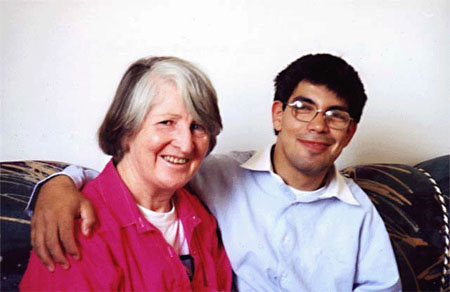
Jean Calder with her adopted son Badi'. Khan Yunis April 1998.
|
 Jean Calder with her adopted son Badi'. Khan Yunis April 1998. |
| Jean Calder, Khan Yunis, Palestinian Red Crescent Society Centre, April 17:
Interview recordings, all in English:
|
|
What is the justification for including an Australian in an archive of Palestinian women's voices? I decided that where Palestinians are concerned, 'belonging' is a matter of political choice, not merely one of birth or official papers. Jean had chosen to join the Palestinian Red Crescent Society when she could have enjoyed a prestigious career in Australia. And she was mother to three orphaned Palestinian children, victims of the war in Lebanon. How could anyone be more Palestinian than that?
I first met Jean during the Israeli invasion of Lebanon in 1982, in a school being used to house evacuees from more dangerous areas. Clinging to her were two children. A third emerged timidly from under the stairs, where blankets and water bottles indicated a shelter. The youngest of these children, Hamoodi, had his arms tightly clasped around Jean's neck. He was paraplegic. The oldest, Dalal, was blind. Badi' had been hit in the spine as a baby and had some difficulty with speech and movement. All three were orphans. Jean had found them in the care of the Red Crescent when she came to work for the Palestinian refugees in Lebanon in 1980. Since then they'd only been parted from Jean for a nine month period, after the Lebanese authorities deported Jean from Lebanon during 1983. Through strenuous effort, and with some diplomatic help, she had succeeded |
in having the three children join her in Cairo, where the PRCS was headquartered for several years. Recently they had all moved to Khan Yunis and were living close to the newly built PRCS center. As a physiotherapist specialized in the care of disabled children, she had worked since 1980 in the rehabilitation section of the PRCS - vital work given the number of war-disabled in the population. Here in Khan Yunis her work was the same.
Like any mother, Jean displaced my interest in her towards her children: to Dalal now studying university-level music by correspondence (I recorded and photographed her playing a flute); to Badi', turned into a sociable, neatly dressed young man who does odd jobs at the PRCS center; and to Hamoodi who lives separately in a next-door apartment. He was wounded in an eye during fighting in Beirut in 1983, he now needs round-the-clock nursing care. Jean wants me to meet him too, and we go for a short visit. She talks to him, raising him up out of his special chair. Just as in 1982, I am amazed by her physical and moral strength. Jean Calder begins her story"I was in Australia, working in the field of disability. My background was education, then physical education, then special education, then recreation - that's my professional base. I had gone to the States twice studying - on scholarships of course. I was working in the University of Queensland..." |
[Umm Ghassan, Manar Dordona] [Umm Muhammad] Copyright©2005 |
|